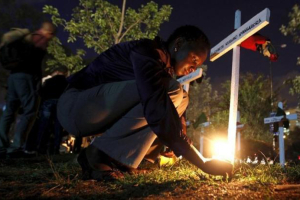Nine months after experiencing a devastating terror attack resulting in the deaths of close to 150 Christian students, Garissa University College in Kenya has reopened, expressing hope that this time, "all will be well and peaceful."
According to a report from BBC News, staff and students are expected back on campus next week, while the college's Twitter page shared photos of students registering for classes.
The college also re-tweeted the sentiments of incoming students:, "#AlShabaab will kill our bodies but will never kill our spirit, we'll rebuild and reopen as if nothing happened," wrote one student. Added another, "Hope this time all will be well and peaceful."
As reported by the Gospel Herald, the terror attack on April 2, 2015, was carried out by Islamic extremists associated with Somalia's al-Shabaab organization. After storming the college, the militants separated Christian and Muslim students before killing as many as 148 people in the 15-hour massacre.
Speaking to Religion News Service, Roman Catholic Bishop Joseph Alessandro of the Garissa Diocese praised the re-opening of the university, but lamented that the majority of the Christian students "are still scared" and will not return to their studies.
However, the bishop added: "We hope they will join soon."
Garissa University College is located in a predominantly Muslim area just 90 miles outside the notoriously violent Somalia, thus making it particularly vulnerable to terrorism.
Speaking to the AFP back in April, Duncan Obwamu, 25, recalled how the militants first targeted a Christian prayer meeting; of the 29 students there, just seven survived.
"We were praying. We were in a circle in the room holding hands," he said, remembering the moment a Shabab gunman stepped into the room and began firing.
"He didn't say anything, but you could see from the look on his face he was very happy," he said.
After leaving the room, the gunman "laughed," Obwamu said: "He was very happy about what he'd done."
Speaking to Morning Star News, one Christian pastor who lives near the Garissa recalled the eerie silence surrounding the University during the attacks.
"I just heard several gunshots as I woke up in the morning, and this continued for several hours within the university compound, which is close to my church," the pastor said.
"What shocked me was that there was no noise of shouts or screaming coming from the university." The church leader said that after talking with the wounded patients at the hospital, he was convinced that Christians were targeted.
"It was a selective kind of attack, as many Muslims went unhurt," he said.
Speaking to RNS, George Ogalo, national director of Fellowship of Christian Unions, an umbrella organization at Kenyan universities and colleges, explained that while many of the Christian students have forgiven their perseuctors, it is unlikely that they will return to the college.
"It is too early to imagine the same students would go back. They have scars and wounds both physically and psychologically, which are still too fresh," he said, adding that the college should reopen with new students and the government should move to assure the students on their security.

















